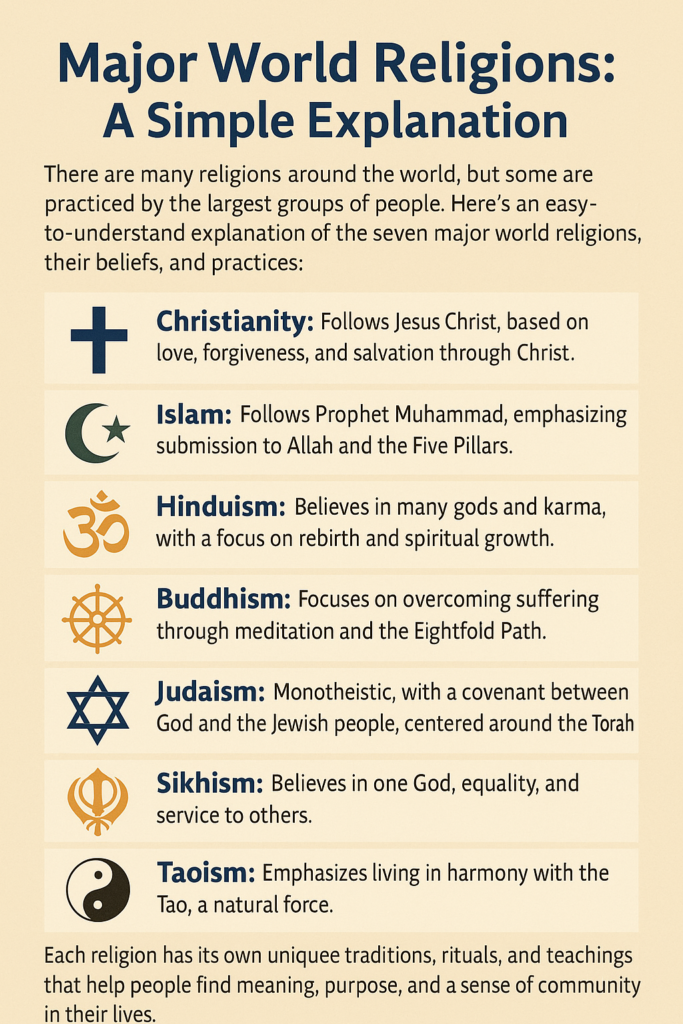Major World Religions: A Simple Explanation
There are many religions around the world, but some are practiced by the largest groups of people. Here’s an easy-to-understand explanation of the seven major world religions, their beliefs, and practices:

1. Christianity
- Followers: About 2.3 billion
- Key Beliefs:
- Christianity is based on the life and teachings of Jesus Christ, who Christians believe is the Son of God and the Savior of humanity.
- Christians believe that Jesus died for the sins of humanity and was resurrected (came back to life).
- The Bible is the holy book, which includes the Old Testament (shared with Judaism) and the New Testament (which tells the story of Jesus and his teachings).
- Key Practices:
- Worship: Christians gather in churches to pray and worship God.
- Sacraments: Important rituals like baptism (initiation) and Holy Communion (eating bread and drinking wine to remember Jesus’ sacrifice).
- Major Branches:
- Catholicism
- Protestantism
- Eastern Orthodoxy
2. Islam
- Followers: About 1.9 billion
- Key Beliefs:
- Islam is based on the teachings of Prophet Muhammad, whom Muslims believe is the final prophet sent by God.
- Muslims believe in one God (Allah) and that Muhammad is the messenger of God.
- The Quran is the holy book of Islam, believed to be the word of God as revealed to Muhammad.
- Muslims believe in life after death and the Day of Judgment, when everyone will be judged by their deeds.
- Key Practices:
- Five Pillars of Islam:
- Shahada: Declaration of faith (“There is no god but Allah, and Muhammad is His prophet”).
- Salah: Praying five times a day.
- Zakat: Giving to charity (a percentage of wealth).
- Sawm: Fasting during the month of Ramadan.
- Hajj: Pilgrimage to the holy city of Mecca (once in a lifetime if possible).
- Five Pillars of Islam:
3. Hinduism
- Followers: About 1.2 billion
- Key Beliefs:
- Hinduism is one of the oldest religions in the world. It doesn’t have a single founder and includes many gods and goddesses.
- Hindus believe in one supreme being (often referred to as Brahman), but they also believe in many gods (like Vishnu, Shiva, and Lakshmi).
- Karma (the belief that actions have consequences) and Reincarnation (the cycle of being born, dying, and reborn) are central to Hindu belief.
- The Vedas are the ancient sacred texts of Hinduism.
- Key Practices:
- Yoga and meditation to connect with the divine.
- Temples are places of worship, where offerings are made to gods.
- Festivals like Diwali (festival of lights) and Holi (festival of colors).
4. Buddhism
- Followers: About 520 million
- Key Beliefs:
- Buddhism was founded by Siddhartha Gautama, known as the Buddha.
- The main goal in Buddhism is to achieve enlightenment (a state of wisdom, peace, and freedom from suffering).
- Buddhists follow the Four Noble Truths, which explain the nature of suffering and how to overcome it.
- The Eightfold Path is a guide for living a life that leads to enlightenment. It includes ethical conduct, meditation, and wisdom.
- Key Practices:
- Meditation to achieve mental clarity and peace.
- Monasteries where monks and nuns live and meditate.
- Festivals like Vesak, which celebrates the Buddha’s birth, enlightenment, and death.
5. Judaism
- Followers: About 15 million
- Key Beliefs:
- Judaism is one of the oldest known religions, based on the belief in one God who made a covenant (agreement) with the Jewish people.
- The Torah is the holy book, which contains teachings, laws, and stories of the Jewish people.
- Jews believe that they are God’s chosen people, given the responsibility to live by His commandments.
- The Messiah (a future leader) is expected to bring peace to the world.
- Key Practices:
- Worship: Jews pray in synagogues, especially on the Sabbath (Friday evening to Saturday evening).
- Kosher food laws: Observing dietary restrictions.
- Important Holidays: Passover (commemorating the Exodus from Egypt) and Yom Kippur (Day of Atonement).
6. Sikhism
- Followers: About 30 million
- Key Beliefs:
- Sikhism was founded by Guru Nanak in the 15th century in India.
- Sikhs believe in one God and the teachings of ten Sikh Gurus (spiritual leaders).
- The Guru Granth Sahib is the holy scripture of Sikhism.
- Sikhs believe in living an honest life, meditating on God’s name, and serving others.
- Key Practices:
- The Five Ks: Sikhs often wear five articles of faith, including a turban and a steel bracelet.
- Gurdwaras: Sikh temples, where they gather to pray and share community meals.
- Seva: Selfless service to others, helping those in need.
7. Taoism
- Followers: About 12 million (mainly in China)
- Key Beliefs:
- Taoism is based on the teachings of Laozi (the founder) and the Tao Te Ching (the central text).
- Taoists believe in living in harmony with the Tao (the Way), a fundamental force that flows through all life.
- It teaches simplicity, humility, and the balance of opposites, often represented by the Yin-Yang symbol (balance between dark and light, feminine and masculine forces).
- Key Practices:
- Meditation and Tai Chi: Practices for inner peace and harmony.
- Rituals and Offerings: Taoists conduct rituals in temples and at home to honor ancestors and deities.
- Following the Tao: Taoism encourages spontaneous action and living naturally, without excessive interference.
Summary of Major World Religions:
- Christianity: Follows Jesus Christ, based on love, forgiveness, and salvation through Christ.
- Islam: Follows Prophet Muhammad, emphasizing submission to Allah and the Five Pillars.
- Hinduism: Believes in many gods and karma, with a focus on rebirth and spiritual growth.
- Buddhism: Focuses on overcoming suffering through meditation and the Eightfold Path.
- Judaism: Monotheistic, with a covenant between God and the Jewish people, centered around the Torah.
- Sikhism: Believes in one God, equality, and service to others.
- Taoism: Emphasizes living in harmony with the Tao, a natural force.
Each religion has its own unique traditions, rituals, and teachings that help people find meaning, purpose, and a sense of community in their lives.
Tags: Bible, Brahman, Buddha, Buddhism, Christianity, Faith Traditions, Five Pillars of Islam, Global Religions., Guru Nanak, Hinduism, Islam, Jesus Christ, Judaism, Karma, Major Religions, meditation, monotheism, Polytheism, Prophet Muhammad, Quran, Reincarnation, Religious Beliefs, Religious Diversity, Religious Festivals, Religious Practices, Religious Rituals, Religious Teachings, Sacred texts, Sikhism, Spiritual Practices, Tao Te Ching, Taoism, Torah, Vedas, World Religions, Yoga


